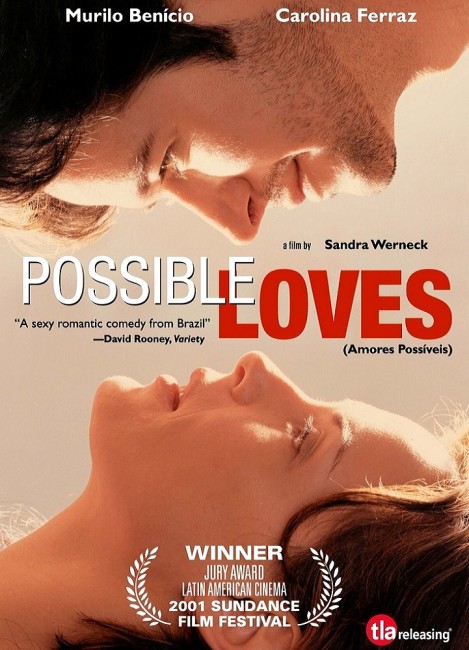(Amores Possiveis)
Crew
Director/Producer – Sandra Werneck, Screenplay – Paulo Halm, Story – Maya Werneck Da-Rin, Photography – Walter Carvalho, Music – Joao Nabuco, Production Design – Claudio Amaral Peixoto. Production Company – Cineluz/Labo Cine do Brasil Ltda/Quanta Centro de Producoes/Julia de Abreu Productions/Eva Mariani/Petrobras Distribuidora/Consorcio Europa
Cast
Murilo Benicio (Carlos), Carolina Ferraz (Julia), Emilio de Melo (Pedro), Irene Ravache (Sophia), Beth Goulart (Maria), Alberto Szafran (Lucas), Christina Fernandes (Agency Secretary), Luiza Mariani (Dandara)
Plot
Carlos goes to meet Julia, a girl he has always loved, on their first date at a cinema but she fails to turn up. Fifteen years later, Carlos is a successful businessman and unhappily married to Maria when he encounters Julia again in an art gallery. He begins an affair with Julia, pretending to Maria that he is away on business trips, while telling Julia that he has left Maria. In another version of events, Carlos is now a gay man who lives with his lover Pedro. He married Julia but she is bitter and angry with him leaving her for Pedro. However, through his return visits to their son Lucas, Carlos comes to realise that he still loves her. In a third version of events, Carlos is a carefree playboy who lives at home with his adoring mother. Sick of all the woman in his life, Carlos goes to a dating agency looking for his soulmate and is given a device that will help locate her. This leads him to Julia who is now a wild and crazy artist.
Possible Loves is a Brazilian film that falls into the fad for alternate life pathway films, particularly of the Chick Flick variety, that were all the fad a few years earlier with the likes of Smoking/No Smoking (1993), Run Lola Run (1998), Sliding Doors (1998), Twice Upon a Yesterday (1998), Me Myself I (1999) and Passion of Mind (2000), as well as the odd bloke version with The Family Man (2000), The Butterfly Effect (2004) and Mr. Nobody (2009). (For a more detailed listing of these see Films About Alternate Timelines).
Possible Loves falls into the pattern staked out by these films in depicting various different outcomes of people’s lives if they had made a crucial choice one way or another at some point. At least, Possible Loves goes out on much more of a limb than some of these films – it devotes one entire storyline to depicting the central character having become a gay man.
Director Sandra Werneck tells the three variant stories with a degree of wry humour – each of the storylines open with a pan up Murilo Benicio’s bed; in the first showing him in bed with his wife, then with another man and then alone, before cutting to different scenarios in the kitchen, each beginning with toast popping up out of the toaster. What is particularly good is the performances given by the two leads Murilo Benicio and Carolina Ferraz. Both are required to undergo genuine chameleon shifts throughout each storyline – he from a bespectacled milquetoast professional who seems detached from the comfortable middle-class lifestyle he leads, to a handsomely polished gay man, to a scruffy, carefree and distinctly boyish playboy.
She undergoes an even more radical shift, vying between an embittered divorcee still simmering over her husband betraying her for another man to a wild and carefree, live-for-the-moment artist. It is these character shifts that make the film work and involve some excellent acting on the part of either actor. There are other good performances elsewhere, especially from Irene Ravache as Murilo Benicio’s mother, where she and Benicio maintain an on-screen rapport that is delightful.
On the minus side, one was disappointed in Sandra Werneck not thinking things out in terms of an alternate timelines scenario. For a film that offers up three different views of two people reconnecting after failing to meet for a date at a cinema fifteen years earlier, Werneck never tells us what caused such widely divergent changes and why these are dependent on that missed date.
Werneck also creates some wide-ranging changes without considering the causes of these or what they would mean for the central character. For example, one timeline establishes that Carlos is now a gay man. So surely that would mean that in all the other timelines Carlos would at the very least have bisexual tendencies? Werneck cannot surely be suggesting that sexual identity is just suddenly something we wake up one day and decide that we are. In another timeline, Carlos lives with a doting and possibly smothering mother, but she is not there in the other timelines. Surely such a figure would have had influence over how the other characters came out, but it is almost by implication that in the other versions of his life Carlos has no mother at all. What we needed to see here was an understanding of how these different character shifts came about, something that would not seem too hard to devise on the face of it.
One was also a little disappointed in the script raising the idea of Carlos and Julia being soulmates and then each of the three stories reaching a conclusion that has the two decide it doesn’t work and settling for someone else. While the film does go out on a brief coda where the two do get together on the original cinema date after all, the dramatic thrust of the bulk of the film is a bittersweet one that says finding the person we think is right for us never seems to work out.
Clip from the film here with subtitles:-


